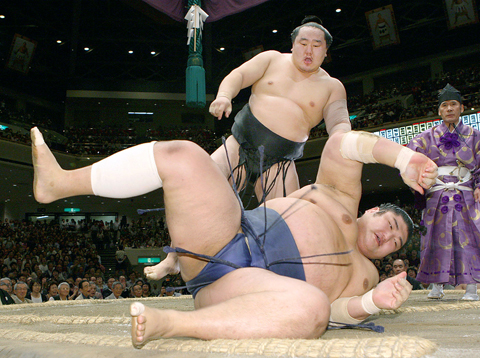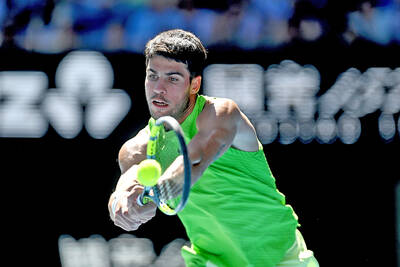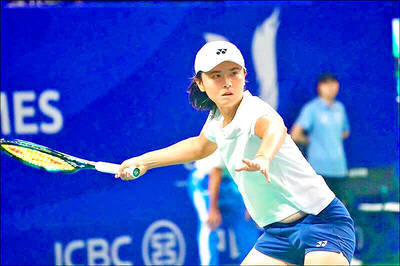Japan’s police chief has vowed to smash the murky links between sumo and yakuza organized crime after a widening scandal over illegal gambling led to the arrest of a former wrestler.
The biggest scandal to tarnish Japan’s ancient national sport in years has led big-name sponsors to pull out millions and put in doubt whether national broadcaster NHK will show the summer tournament next month.
Governing body the Japan Sumo Association has said 29 unnamed wrestlers had admitted to illegal gambling, although media reported that 36 others also had bet on cards, baseball, golf and other pursuits.

PHOTO: AFP
As investigators seek to untangle the links between the big boys of sumo and the bad boys of the Japanese mafia, police on Thursday arrested a former wrestler, Mitsutomo Furuichi, 38, on extortion charges.
Furuichi, who reportedly told police that he is a former gangster, allegedly demanded hush money from a sumo wrestler who had been involved in widespread gambling on baseball matches and other sports.
“He is suspected of blackmailing the victim ... and received ¥3.5 million [US$39,000] in cash,” a police spokesman said.
Media reported the victim of the extortion attempt was wrestler Kotomitsuki — ranked second only to the yokozuna, or grand champion.
“We have to clean yakuza crime links out of the sumo world,” National Police Agency chief Takaharu Ando said after the latest news to tarnish the sport that has been at the heart of Japanese culture for 2,000 years.
Those links became apparent last month when sumo officials were disciplined after it emerged that they had given ring-side seats at a sumo tournament to top bosses of the Yamaguchi-gumi, Japan’s largest crime group.
Because NHK broadcasts of tournaments are shown in Japan’s prisons, the ring-side seats allowed crime bosses to send a silent message of support to their members doing time behind bars, commentators said.
The sumo association censured those who made the tickets available to the gangsters — but the case highlighted connections between two of Japan’s most macho and mystery-shrouded institutions.
Sumo, based on ancient Shinto rituals, puts its wrestlers through punishing workouts and an austere and strictly hierarchical lifestyle in the isolation of their “sumo stables.”
Once populated by tough country boys, and increasingly by foreign-born wrestlers, it is a world of 3am roll calls and grueling workouts where only the toughest fighters last to reach the top.
About 90 percent of stables have allowed beatings of trainees and punishments such as forcing salt or sand into their mouths, the sumo association has said.
Many Japanese were shocked by the 2007 case of a stable master who ordered the “hazing” of a 17-year-old wrestler who died after being beaten with a beer bottle and a baseball bat. The stable master was jailed.
While sumo is a tough and cloistered world of male athletes, the true bad boys of Japan have long been the yakuza, whose heavily tattooed gangsters have spawned numerous movies, manga comics and fanzines.
The yakuza, who trace their roots to samurai gone astray during the 17th-century Edo period, traditionally relied on gambling, prostitution, loan-sharking and protection rackets as their bread and butter.
In recent decades they have turned to money laundering, deposit fraud, cybercrime and extorting huge sums from blue-chip companies by threatening to show up at their shareholder meetings.
They have operated relatively openly, entertaining close ties with politicians, and police have tolerated their existence as long as they have stayed on their turf and kept down street crime.
Amazingly for outsiders, yakuza groups themselves are not illegal and openly operate from large corporate headquarters.
Japanese organized crime counts about 82,600 members, according to the National Police Agency — nearly half of them with the Kobe-based Yamaguchi-gumi, dubbed the “Wal-Mart of crime syndicates.”

The Philadelphia 76ers, fueled by 36 points from Tyrese Maxey and a triple-double from Joel Embiid, on Thursday beat the Houston Rockets 128-122 in an NBA overtime thriller. Cameroonian big man Embiid scored 32 points, grabbed 15 rebounds and handed out 10 assists, posting the ninth triple-double of his career to help the Sixers end the Rockets’ three-game winning streak. Rockets star Kevin Durant scored 36 points and Amen Thompson added 17, but Thompson was scoreless in the fourth quarter. Even so, the Rockets led by nine midway through the final frame, Maxey tying it at 115-115 with 40.1 seconds left. Durant missed a

The Milwaukee Bucks’ Giannis Antetokounmpo on Friday said that he will probably be out for an extended period after hurting his right calf again after a similar injury caused him to miss eight games earlier this season. Antetokounmpo had his right calf wrapped in the first half of their 102-100 loss to the Denver Nuggets. He did not appear comfortable the rest of the night and left for good with 34 seconds remaining. “At the end, I could not move no more, so I had to stop playing,” Antetokounmpo said. The two-time NBA Most Valuable Player said he expected to undergo an MRI

Taiwanese FORTUNES: Wu Fang-hsien and Hsieh Su-wei both advanced to the last 16 of the women’s doubles, but Ray Ho was ousted in the men’s doubles Carlos Alcaraz yesterday stepped up his quest to win a maiden Australian Open as he overwhelmed showman Corentin Moutet to reach the last 16, while Taiwan’s Wu Fang-hsien and Hsieh Su-wei both advanced to the last 16 of the women’s doubles. Three-time finalist Daniil Medvedev battled through on day six at a warm and sunny Melbourne Park, as did Coco Gauff. Top seed Alcaraz was never in danger against French 32nd seed Moutet, easing through 6-2, 6-4, 6-1 at Rod Laver Arena in 2 hours, 5 minutes. It was the Spaniard’s 100th Grand Slam match and he boasts a remarkable 87-13 win-loss record,

LICENSE TO THRILL: Fans of Learner Tien, the youngest man to reach the quarter-finals in 11 years, wore ‘L Plates,’ signs for learning drivers, in support of the 20-year-old Taiwan’s Wu Fang-hsien and Japanese partner Eri Hozumi yesterday dominated eighth seeds Ellen Perez of Australia and the Netherlands’ Demi Schuurs to advance to the Australian Open quarter-finals, the furthest the Taiwanese has made it since her first appearance in Melbourne in 2020. Wu and Hozumi overpowered world No. 21 Perez and world No. 20 Schuurs 6-2, 6-2 in 1 hour, 11 minutes at 1573 Arena in much cooled temperatures since Saturday’s blazing 40°C disrupted play. World No. 34 Wu has now made it further in the Australian Open since she was knocked out in the third round in 2024. The Taiwanese-Japanese duo